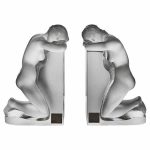Dear Lee,
A famous child prodigy who could spell at age 1, read at 1 1/2 and speak Greek and Latin by 3 enrolled at Harvard when he was 11 and then worked as a college professor. But he left teaching and worked only menial jobs while spending most of his time on his collecting passion, streetcar transfers. He died at 46. His story is told in psychology textbooks. Other geniuses who collected trivial objects are also used as examples in studies of compulsive behavior. So is it a compulsive obsession to have a large collection of firecracker labels or doorknobs—but not if the collection is million-dollar paintings or rare coins?
Ignore doctors and critics unless your collection gets so large there is no room for you in your house. Maybe we have a collecting gene and are storing things for an unknown future. Or, as some experts now claim, finding that “special collectible” sets off endorphins that create pleasure, just like running a race, hearing music or winning at gambling.
Sometimes our collections turn out to be historically important or valuable. Most times they help keep us healthy and happy. As you age, doctors say, you should keep physically active (walk through a flea market), make new friends (join a club or go online to chat with other collectors), keep your mind active by learning something new (research prices, history and marks for your collection), avoid obesity (at shows you get exercise—but terrible food) and stave off depression (those endorphins chase the blues).
Enjoy your streetcar tokens or barbed wire collection. It doesn’t take a genius to know that collecting isn’t an obsession. It’s a joy.




Leave a Reply
You must be logged in to post a comment.